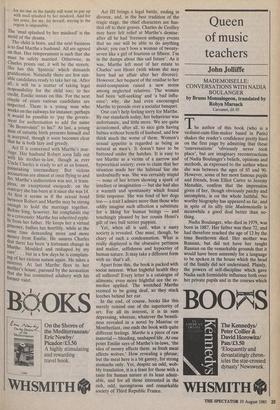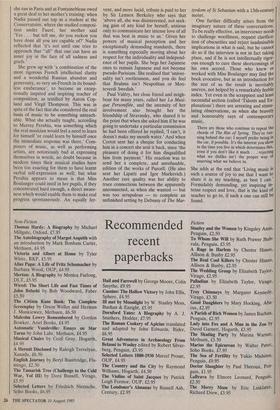Queen of music teachers
John Jolliffe
MADEMOISELLE: CONVERSATIONS WITH NADIA
BOULANGER by Bruno Monsaingeon, translated by Robyn Marsack
Carcanet, f6.95
The author of this book (who is a violinist-cum-film-maker based in Paris) shakes the reader's confidence pretty hard on the first page by admitting that these `conversations' obviously never took place', but are imaginary reconstructions of Nadia Boulanger's beliefs, opinions and methods, as expressed to the author when she was between the ages of 85 and 90. However, some of her more famous pupils and friends, from Elliot Carter to Jeremy Menuhin, confirm that the impression given of her, though obviously patchy and incomplete, is on the whole faithful. No worthy biography has appeared so far, and in spite of its silly title Mademoiselle is meanwhile a good deal better than no- thing.
Nadia Boulanger, who died in 1979, was born in 1887. Her father was then 72, and had therefore reached the age of 12 by the time Beethoven died. Her mother was Russian, but did not have her taught Russian on the remarkable grounds that it would have been unseemly for a language to be spoken in the house which the head of the family did not understand. Plainly, the powers of self-discipline which gave Nadia such formidable influence both over her private pupils and in the courses which she ran in Paris and at Fontainebleau owed a great deal to her mother's training: when Nadia passed out top as a student at the Conservatoire, where she studied composi- tion under Faure, her mother said `Yes . . . but tell me, do you reckon you have done all you are capable of?' Nadia reflected that 'it's not until one tries to approach that "all" that one can have an inner joy in the face of all sadness and griefs.'
She grew up with 'a combination of the most rigorous French intellectual clarity and a wonderful Russian abandon and generosity, so very un-French in its bound- less exuberance', to become an excep- tionally inspired and inspiring teacher of composition, as testified by Aaron Cop- land and Virgil Thompson. This was in spite of the fact that she considered the real basis of music to be something unteach- able. What she actually taught, according to Murray Perahia, was something which the real musician would feel a need to learn for himself 'or could learn by himielf once the immediate response was there.' Com- posers of music, as well as performing artists, are notoriously bad at expressing themselves in words, no doubt because in modern times their musical studies have been too exacting for them to have learnt verbal self-expression as well; but what Perahia appears to mean is that Miss Boulanger could instil in her pupils, if they concentrated hard enough, a direct aware- ness which would enable them to make real progress spontaneously. An equally fer-
vent, and more lucid, tribute is paid to her by Sir Lennox Berkeley who says that `above all, she was disinterested, not seek- ing gain of any kind for herself, anxious only to communicate her intense love of all that was best in music to us.' Given her powers of musical perception and her exceptionally demanding standards, there is something especially moving about her respect for the individuality and independ- ence of her pupils. She begs her Japanese ones to remain Japanese and not become pseudo-Parisians. She realised that 'univer- sality isn't rootlessness, and you do feel that Brahms isn't Neapolitan or Mon- teverdi Swedish.'
Paul Valery, her close friend and neigh- bour for many years, called her La Musi- que Personifige, and the intensity of her involvement also brought her the friendship of Stravinsky, who shared it to the point that when she asked him if he was going to undertake a particular commission he had been offered he replied, 'I can't, it doesn't make my mouth water.' And when Cortot sent her a cheque for conducting him in a concert she sent it back, since 'the pleasure of doing it for him disqualified him from payment.' His reaction was to send her a complete, and unrefusable, edition of the works of Purcell. (He also sent her Lipatti and Igor Markevich.) Another rare quality was her ability to trace connections between the apparently unconnected, as when she wanted - but was too scrupulous - to complete an unfinished setting by Debussy of The Mar- tyrdom of St Sebastian with a 13th-century motet.
One further difficulty arises from the imaginary nature of these conversations. To be really effective, an interviewer needs to challenge woolliness, request clarifica- tion of obscurities and reject inadmissible implications in what is said, but he cannot do so if the interview is not in fact taking place, and if he is not intellectually rigor- ous enough to cure these shortcomings of his own accord. Those who knew or worked with Miss Boulanger may find the book evocative, but as an introduction for the rest of us the result is inevitably uneven, not helped by a remarkably feeble index. Yet even in the scrappiest and least successful section (called 'Talents and Ex- planations') there are arresting and stimu- lating observations, as when she bravely and honourably says of contemporary music, There are those who continue to repeat the chords of The Rite of Spring. They're run- ning behind the car; I myself prefer being in the car, if possible. It's the interest you show in the time you live in which determines this, even if you don't like it much . . rejecting what we dislike isn't the proper way of asserting what we believe in.
She adds at the end that 'Living music is such a source of joy to me that I want to share it in my teaching, as best I can. Formidably demanding, yet inspiring in- tense respect and love, that is the kind Of teacher to go to, if such a one can still be found.











































 Previous page
Previous page